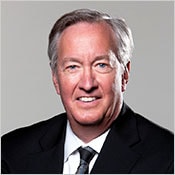2 Min WatchArticle30 Oct 2023
The Case of Round Numbers
At a Glance
In financial markets, there is an intriguing magnetic power with round numbers. When markets get close to these critical round numbers, they act like lines in the sand and trading activity seems to change its character.
Round numbers can’t seem to hold; either there is a decisive breakthrough or a big move backward. Let’s take two cases that are active now.
5% Yield on 10-Year U.S. Treasuries
Is it a ceiling or a floor? U.S. 10-year Treasuries have had three significant episodes since the start of the COVID-19 pandemic. In late 2020 and into 2021, the massive fiscal stimulus from the U.S. government to help cushion the blow of the pandemic helped raise yields on the Treasury 10-year from below 1% to near 2%. In 2022, as the Federal Reserve raised short-term rates, the U.S. 10-year powered through 3% and peaked just above 4%. The latest move, taking 10-year yields closer to 5%, came as the U.S. economy continued to grow, surprising most analysts (although not us) that had thought rising rates and an inverted yield curve would lead to a recession. Will 2024 be different?
150 Yen per U.S. Dollar Exchange Rate
The first question currently revolves around when the Bank of Japan will start raising short-term interest rates, and the second question revolves around just how high might Japanese short-term interest rates go. While the question as to when rates might rise may be answered first, the peak rate question may be more important in the long run for the exchange rate. The Federal Reserve has guided that U.S. rates are likely to stay high for a long time. This means that U.S. rates will continue to have a robust premium over Japanese rates.
The bottom line is that when round numbers become important, it creates an event risk environment. The line may hold or be crossed, but when round numbers take on outsized importance, it is indicative of a very unstable market favoring non-directional options strategies for risk management.
OpenMarkets is an online magazine and blog focused on global markets and economic trends. It combines feature articles, news briefs and videos with contributions from leaders in business, finance and economics in an interactive forum designed to foster conversation around the issues and ideas shaping our industry.
All examples are hypothetical interpretations of situations and are used for explanation purposes only. The views expressed in OpenMarkets articles reflect solely those of their respective authors and not necessarily those of CME Group or its affiliated institutions. OpenMarkets and the information herein should not be considered investment advice or the results of actual market experience. Neither futures trading nor swaps trading are suitable for all investors, and each involves the risk of loss. Swaps trading should only be undertaken by investors who are Eligible Contract Participants (ECPs) within the meaning of Section 1a(18) of the Commodity Exchange Act. Futures and swaps each are leveraged investments and, because only a percentage of a contract’s value is required to trade, it is possible to lose more than the amount of money deposited for either a futures or swaps position. Therefore, traders should only use funds that they can afford to lose without affecting their lifestyles and only a portion of those funds should be devoted to any one trade because traders cannot expect to profit on every trade. BrokerTec Americas LLC (“BAL”) is a registered broker-dealer with the U.S. Securities and Exchange Commission, is a member of the Financial Industry Regulatory Authority, Inc. (www.FINRA.org), and is a member of the Securities Investor Protection Corporation (www.SIPC.org). BAL does not provide services to private or retail customers.. In the United Kingdom, BrokerTec Europe Limited is authorised and regulated by the Financial Conduct Authority. CME Amsterdam B.V. is regulated in the Netherlands by the Dutch Authority for the Financial Markets (AFM) (www.AFM.nl). CME Investment Firm B.V. is also incorporated in the Netherlands and regulated by the Dutch Authority for the Financial Markets (AFM), as well as the Central Bank of the Netherlands (DNB).
 By Blu Putnam
By Blu Putnam
